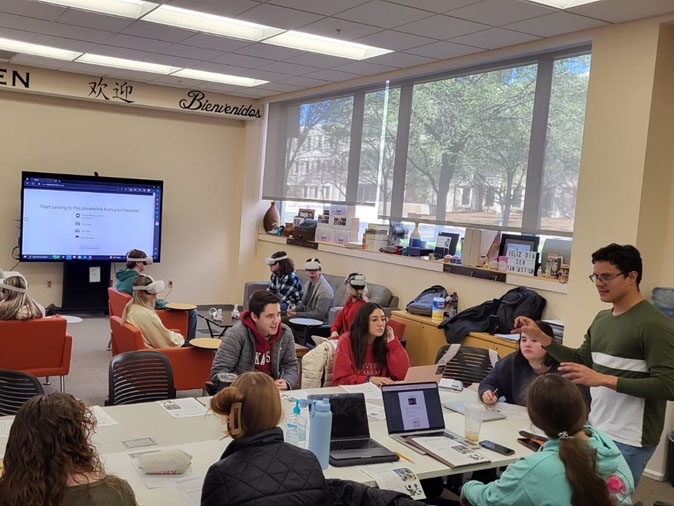Teaching Assistants Let Students Explore Casa Batlló and Learn Spanish via Virtual Reality

Jhonatan Carmona Tangarife, right, guides his Intermediate Spanish students through the immersive virtual-reality experience in Casa Batlló and conjugating the Spanish preterite tense.
The World Language and Digital Humanities Studio hosted two full Spanish Intermediate I classes utilizing virtual-reality resources for language learning and a culturally immersive experience in Casa Batlló in Barcelona, Spain, on March 17.
The SPAN 1013 students were taught by Spanish teaching assistant Jhonatan Carmona Tangarife, a master's student in Spanish who is also a studio researcher in the World Language and Digital Humanities Studio. Carmona, a doctoral candidate in comparative literature and cultural studies, works as a full-time teaching assistant and part-time researcher, and he incorporates his VR research with his teaching philosophy, applying a practical approach by bringing his Intermediate I students to the studio to get hands-on experience with VR for language learning.
The 26 students from two different sections explored Spanish architecture and practiced vocabulary and the Spanish past tense. Michael Hall, another studio researcher and doctoral candidate in comparative literature and cultural studies, co-led the VR session with Carmona.
Students completed a workshop designed by Carmona based on the script of a 360-degree video of Casa Batlló for which they needed to conjugate verbs in preterite tense and noun agreement before exploring the cultural immersion video with eight Quest headsets simultaneously. Additionally, the students played with a language learning VR game called Language Lab, where they got to practice vocabulary with games similar to Beat Saber, Hot Shot and Ultimate Climbing.
When asked "what gave you the idea to incorporate VR immersion into your Spanish classes?" Carmona said:
"Being a Spanish TA and a digital humanities researcher at the WLDHS, part of my research leads me to explore the use of VR resources to teach languages and enhance cultural learning experiences to L2 students in order to keep up with technological advances that can benefit our field, as well as the way these resources can be incorporated into our language methodologies," Carmona explained. "My intention is to promote the use of innovative technologies that will benefit students' learning experiences by shortening the distance between their environment and that of the target language. I want to help to establish lesson plans that incorporate VR as a way to promote culture and language learning."
Intersecting virtual reality with world language learning is not necessarily a new endeavor for Carmona or Hall. In fact, Hall and Carmona formed the Virtual Reality (VR) Club for Language Learning in fall 2022, planning and leading weekly sessions over the course of the semester that focused on a variety of languages — including Spanish, German and French — as well as an immersive VR tour of Argentina using MetaQuest 2 VR headsets. The goal of the VR Club is to explore how VR can be used to assist with learning world languages through real-time conversation practice, pronunciation, problem-solving in the target language and cultural immersion. This exploration is part of an ongoing research project conducted by both Hall and Carmona, as well as Xanterra Burkes (social work and Spanish undergraduate) through the WLLC Student Success Award research funds.
Carmona's students provided feedback from the sessions as well.
"I have not used VR before in a language class," said one student. "I think that using 360 videos is exciting and different; also, I think it helps to visualize the vocabulary we may be learning in particular units of the class. These videos are useful for expanding upon the cultures we are learning about in class as well."
Another student compared their previous VR experience with using it in their Spanish class: "I've used VR in architecture classes before, but I have never used it in a language class. VR is a good way to show real architecture, especially in places that most students have never been to or cannot reach easily. I think more classes should utilize VR if they are able to because it provides students a more realistic experience."
Virtual reality may seem daunting at first, but even students without any VR experience found the incorporation enjoyable: "That was the first time I ever used VR and it seems like the next step when it comes to learning different cultures and other subjects with visual elements."
For more information about VR Club for language learning, please contact Michael Hall at mh150@uark.edu or Jhonatan Carmona at jc170@uark.edu.
Topics
Contacts
Cheyenne Roy, assistant director
World Languages and Digital Humanities Studio
479-575-4159,
ceroy@uark.edu
Headlines
2024 GirlTREC Transportation Engineering Day Camp July 8-12
The U of A College of Engineering will host GirlTREC, its annual girls' transportation engineering summer day camp, on the Fayetteville campus July 8-12. Apply now. Scholarships are available.
Graduate Students in Communication Sciences and Disorders Awarded With Recognition for Program
Karina Escobar, Heather Prinz and Abigail Hagner were recognized for their professional excellence, clinical skills and academic abilities in and out of the classroom.
Communication Sciences and Disorders Program Honors Millar as 2024 Mentor of the Year
Carrie Millar, who has more than 20 years experience in speech-language pathology and works at Washington Regional, was awarded the Mentor of the Year for her work with U of A graduate students.
U of A Emerging Tech Accelerator Boosts Sales for Startup Cohort
Launched in January, the Bounds accelerator helped rev up sales of all 10 companies in its inaugural cohort, growing these ventures through a partnership between the U of A and Cartwheel Startup Studio.
Arkansas Academy of Industrial Engineering Inducts Members, Announces Faculty, Staff Awards
David Bates, David Boguslawski, Julia Carmack, Rafael Merida, Lindsey Simpson, Kelly Sullivan and Ed Pohl, honorary, were inducted into the Arkansas Academy of Industrial Engineers in April.




